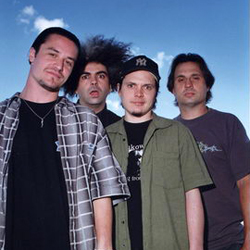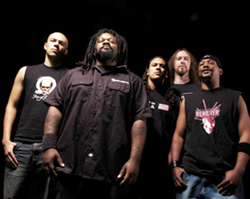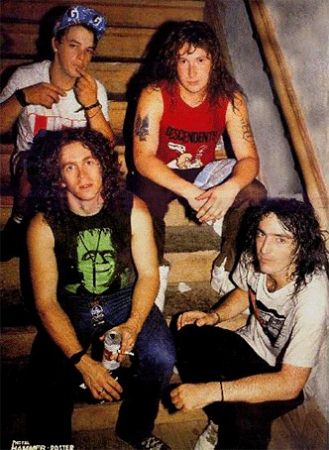
MILEMARKER
The more things change…
By Jason Schreurs
They’ve often been called The Milemarker Collective due to the revolving nature of their band lineup and constantly evolving sound. But one thing that’s remained constant with Chicago-based post-hardcore band Milemarker over the years is the close friendship and collaborative dedication of original members Dave Laney and Al Burian.
“We’ve been friends for a very long time. And we’ve been stuck in a van together for a very long time,” explains Laney. “Sometimes the proximity of a lot of years spent together let’s you be a little more critical… because it’s almost like part of the family. It gives you a thicker skin, until the knife cuts in too deep.”
Laney is only joking about the knife part. He and Burian (also known for his Burn Collector writings) have found endless ways to inspire and motivate each other over the years.
Formed in 1997 by Laney and Burian, along with drummer Ben Davis, Milemarker has gone through many players in the course of five albums and a couple of EPs. The member shuffling became so chronic Laney and Burian eventually decided to implement an open door policy allowing people to leave and return at their will.
This was handy for Davis, who recently came back to the band to help write their new album, Ominosity, after an extended hiatus while he and his partner had a baby. Davis will not be touring for Ominosity but, as mentioned, there’s always someone from the ranks of past (or future) Milemarker members to take his place.
“Something that we’ve always tried to do is keep it a little bit looser with the potential to mold it around whatever’s happening,” says Laney. “Whoever’s in the band is whoever’s playing with the band at that moment.”
One noticeable shift on Ominosity is its epic collection of seven or eight-minute dark epics; Laney is clear the band was trying to move away from the “synth-poppy” material of previous albums. Even more evident is the absence of vocalist/synth player Roby Newton. The lack of her piercing wail and sultry lilt could have been insurmountable voids, but with the help of three guest female vocalists and the many different textures Ominosity offers, it’s not a growing concern.
“She definitely was a big element of the band, and a lot of people have said, ‘Where the hell’s Roby?’” says Laney. “But her leaving was just something that happened. She was in and out of the band since the band started. She is missed, you know, and definitely having a female element to the band is important to us.”
Milemarker are perhaps best remembered for being staunch critics of the fashion-conscious hardcore scene of the late ‘90s, using their Frigid Forms Sell album motif to comment on just how silly the style over substance trend had become. Oddly, only a few years later, the band’s worst fears have been realized.
“[Frigid] looked like a lot of record covers actually look now,” marvels Laney. “They do promo photos where someone comes in for $500 to do a photo shoot… It’s all so slimy, the whole industry of it.”
And while countless bands today are content being cogs in a larger machine, Milemarker measures success on their own meter of happiness.
“I feel good about the music that we’re making right now. I feel good about the live show and it’s pretty exciting to me,” says Laney. “But I think everyone that makes music feels like their thing is important. They either think they are the best band in the world or they think they’re the worst band. Either you’re self-hating or you are a Superman-complex person.”
And which one are they? “Probably more towards the self-hating. I’m not gonna call up Rolling Stone and say, ‘Hey, you guys gotta put us on the cover. Do you know what you’re missing?! Here’s our press package. Check it out. Get back with me,’ he laughs. “I never understood it like that.”
Milemarker’s secret of uncompromising success is the consistency and longtime devotion of Laney and Burian to a project they obviously hold dear to their hearts. They even formed another project called Challenger, releasing and album and an EP in the past two years during an off-time for Milemarker. But this begs the question of whether Milemarker would continue if one of them ever left the band.
“Yeah, I don’t think it could go on. That would be pretty weird…” imagines Laney, “but, whatever, bands do weird stuff. There’s a festival coming up in Chicago and the bands are The Misfits, The Germs, and, what is the other band… Black Flag…”
“No, wait,” he interjects with another imposter band, “it’s The Dead Kennedys.”
“I don’t think we’ll ever be in that position…” chuckles Laney. “That’s not gonna happen with Milemarker.”




















